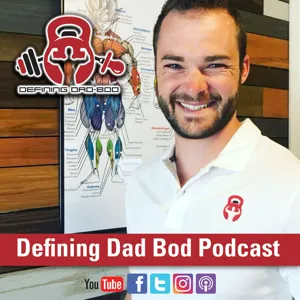Podcast Summary
Understanding Metabolism: Beyond Calories Burned: Focus on a balanced diet for effective weight loss and overall health, rather than solely increasing physical activity to burn more calories.
Metabolism refers to all the energy-using processes in the body, most of which occur without conscious awareness. Contrary to popular belief, increasing physical activity does not significantly increase the number of calories burned, but it does have other important health benefits. Instead, focusing on a balanced diet and understanding which foods support healthy metabolic processes can be more effective for weight loss and overall health. Dr. Herman Ponser, an expert in this field, shares insights from his research in the Art of Manliness podcast episode "Burn: New Research on Metabolism, Weight Loss, and Health."
Understanding Energy Expenditure: BMR, NEAT, and Circadian Rhythms: Most of our energy goes to maintaining BMR, some to NEAT, and circadian rhythms affect energy use. Carbs are main energy source, protein, carbs, and fats metabolized differently.
The majority of our energy expenditure goes towards maintaining our basal metabolic rate (BMR), which includes resting energy expenditure for functions like thinking, breathing, and heart beating. However, we also burn energy through non-exercise activity thermogenesis (NEAT), such as fidgeting and standing up to get a cup of coffee. Additionally, our energy expenditure varies throughout the day due to circadian fluctuations, with more energy being burned during peak alertness hours. When we consume food, our body converts macronutrients - protein, carbs, and fats - into energy differently. Carbohydrates are broken down into simple sugars like glucose, which is the primary source of energy for the body. Understanding these energy expenditure components and macronutrient metabolism can provide valuable insights into overall health and wellness.
Understanding our bodies' energy conservation as hunter-gatherers: Despite being physically active, hunter-gatherer communities do not burn significantly more calories than sedentary people due to their bodies' efficiency in conserving energy.
Our bodies convert the food we eat into energy (glucose and fat) or building blocks (proteins), and we are constantly cycling through the breakdown and rebuilding of tissues. The common belief that being physically active burns more calories than being sedentary is not always true. Research on hunter-gatherer communities, like the Hosda in Africa, shows that despite their active lifestyle, they do not burn significantly more calories than sedentary people due to their bodies' efficiency in conserving energy. Our bodies evolved over millions of years as hunter-gatherers, and understanding how they function in this context provides valuable insights into their design and adaptations.
Physical activity doesn't always equal more energy expenditure: Despite high levels of physical activity, the Hodzan people and endurance athletes have similar daily energy expenditures due to lower inflammation and reproductive hormones.
Despite the Hodzan people in Northern Tanzania being incredibly physically active, burning an average of 13,000 steps a day for women and 19,000 steps a day for men, their daily energy expenditure is indistinguishable from that of sedentary Westerners when accounting for body size. This is due to their bodies reducing caloric expenditure in other areas, such as lower levels of baseline inflammation and reproductive hormones. Research suggests that physically active individuals have lower levels of inflammation, which means their immune systems are spending less energy. Additionally, their reproductive hormones, such as testosterone and estrogen, are lower. These findings have been observed not only in the Hodzan people but also in endurance athletes. Overall, the body adapts to accommodate a high level of physical activity by making adjustments in other areas to maintain overall energy balance.
Physically active individuals have a more efficient use of energy: Active people conserve energy for survival and reproduction, prioritizing these functions over reproductive processes in times of extreme activity or survival.
Physically active individuals, such as those in the HODS study, have a more efficient use of energy due to their bodies prioritizing survival and reproduction. This results in a decrease in energy expended on maintaining reproductive functions and a reduced stress reaction. The body's metabolism is geared towards these goals, and in times of extreme physical activity or survival, the reproductive system may take a back seat. This adaptation is likely more beneficial for long-lived species like humans, as it allows for energy conservation and increased chances of survival. The HODS study's findings on energy expenditure in physically active individuals are solid and have been replicated using various techniques. It's important to note that this doesn't indicate fertility issues or a lack of masculinity in men with lower testosterone levels. Instead, it's a natural adaptation to conserve energy for survival and reproduction.
Body's energy expenditure stays consistent despite exercise: Exercise alone may not lead to significant weight loss. A balanced diet and regular physical activity are key to sustainable weight management.
Our bodies have a regulated daily energy expenditure that is largely determined by body size, and exercise alone may not be an effective strategy for weight loss. Across various human and animal studies, it has been observed that despite increased physical activity, daily energy expenditure remains relatively consistent. This is due to the body's ability to compensate for increased activity by adjusting metabolic rate and energy intake. While exercise is still important for overall health, focusing solely on exercise for weight loss may not yield desired results. Instead, a combination of balanced diet and regular physical activity is recommended for sustainable weight management.
Our bodies resist significant weight loss: Gradual diet changes are key for sustainable weight loss, while exercise remains important for overall health. Our unique human metabolism requires daily physical activity to function optimally.
The body has evolved mechanisms to resist significant weight loss. Rapid weight loss attempts can lead to a decrease in energy expenditure, making it harder to continue losing weight. This is due to our long evolutionary history where weight loss was often a sign of impending death. While it's important to try to maintain a healthy weight from the start, if weight loss is necessary, it's best to approach it gradually through diet changes. Exercise is still crucial for overall health, but it's not the sole driver of weight loss. Our unique human metabolism, developed through millions of years of being hunter-gatherers, requires a lot of physical activity daily. Without it, we can experience negative health consequences. Despite common beliefs, we cannot directly control or speed up our metabolism. Instead, we must work with our bodies to make sustainable changes.
Differences in Physiology and Energy Usage between Apes and Humans: Apes have slow metabolisms and don't need to store fat due to their sedentary lifestyle. Humans, with faster metabolisms, require more movement and store fat as a backup energy source. Exercise aids in weight maintenance by regulating hunger and fullness.
Apes and humans have distinct differences in their physiology and energy usage due to their different ways of obtaining food. Apes, being omnivores in the wild, don't need to move much to find food and have a slow metabolism, making it unnecessary for them to store body fat. Humans, on the other hand, are high-energy beings with a faster metabolism, requiring us to move more and store fat as a backup energy source. Exercise plays a crucial role in maintaining weight loss by regulating hunger and fullness, making it an essential component of a healthy lifestyle. Despite popular belief, exercise alone may not lead to significant weight loss, but it does help keep the weight off once it's been lost.
Exercise's Role in Weight Loss and Maintenance: Exercise regulates appetite, controls hunger signals, and maintains metabolism for weight loss and maintenance. Focusing on overall calorie intake is more effective than reducing carbs alone. Exercise provides health benefits beyond weight management.
Exercise plays a crucial role in both weight loss and maintenance. It helps regulate appetite by matching caloric needs, controlling hunger signals, and maintaining a healthy metabolism. Contrary to popular belief, reducing carbohydrate intake is not the only solution for weight loss. Controlled studies have shown no significant difference in weight loss outcomes between low-carb and low-fat diets when calories are equally reduced. Instead, focusing on overall calorie intake is the most effective way to lose weight. Exercise not only helps with weight management but also provides numerous health benefits, including reducing inflammation, maintaining reproductive hormones, and improving stress reactivity. Ultimately, exercise and a balanced diet work together to improve overall health and longevity.
Understanding the role of the brain in feeling full on fewer calories: Focusing on high fiber, protein foods can help dieters feel full and lose weight by managing brain signals of hunger and fullness
The mechanism behind the effectiveness of low carb diets may not be solely related to insulin levels, but rather how certain foods make us feel full on fewer calories. The brain plays a crucial role in managing our fullness and hunger based on the calories we consume. By focusing on foods high in fiber and protein, dieters can feel full and satisfied while consuming fewer calories, leading to weight loss. This concept is not limited to low carb diets, as eating less palatable foods can also help people feel full and lose weight. The key is finding a way to eat that makes us feel full without overconsuming calories. This idea goes beyond the popular belief that metabolism can be significantly influenced by exercise or specific macronutrient intake.
Metabolism stability from 20s to 60, decline after 60: Metabolism remains consistent from ages 20 to 60, but declines after age 60, possibly due to stress, hormones, or other factors. This decline could be a sign of healthy aging.
Contrary to popular belief, metabolism does not significantly slow down in our 30s and 40s. A recent study involving 6,400 participants of all ages found that metabolic stability remains consistent between ages 20 and 60. However, metabolism does begin to decline after age 60, which may be linked to increased disease risk. This decline could be due to changes in stress levels, hormones, or other factors. From an evolutionary perspective, this decline may be related to the fact that after age 60, individuals are no longer reproducing and instead focus on helping their families and communities. This shared work and support is a fundamental aspect of human nature. The decline in metabolism after 60 may be an indicator of healthy aging, and further research is needed to understand the underlying causes.
Natural weight loss process around age 60: Focus on whole, high-fiber or high-protein foods, avoid processed foods and sugary beverages, eliminate mindless eating habits, and adopt sustainable diet and exercise habits for long-term success.
Our bodies are naturally programmed to slow down around the age of 60, and this is an evolved part of our physiology. This information can guide individuals in their approach to weight loss by focusing on diet and exercise as separate tools. For weight loss, diet should consist of whole, high-fiber or high-protein foods that make you feel full with fewer calories. Avoid processed foods and sugary beverages, which are engineered to make you overeat. Additionally, identify and eliminate mindless eating habits, such as consuming calories without being hungry. Extreme calorie cutting is not sustainable and can negatively impact metabolism and overall health. For more information, check out Dr. Herman Ponser's book "Burn" and his lab's website at Duke University. Remember, sustainable habits lead to long-term success.













